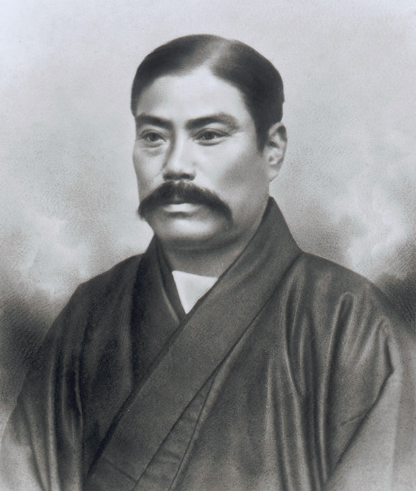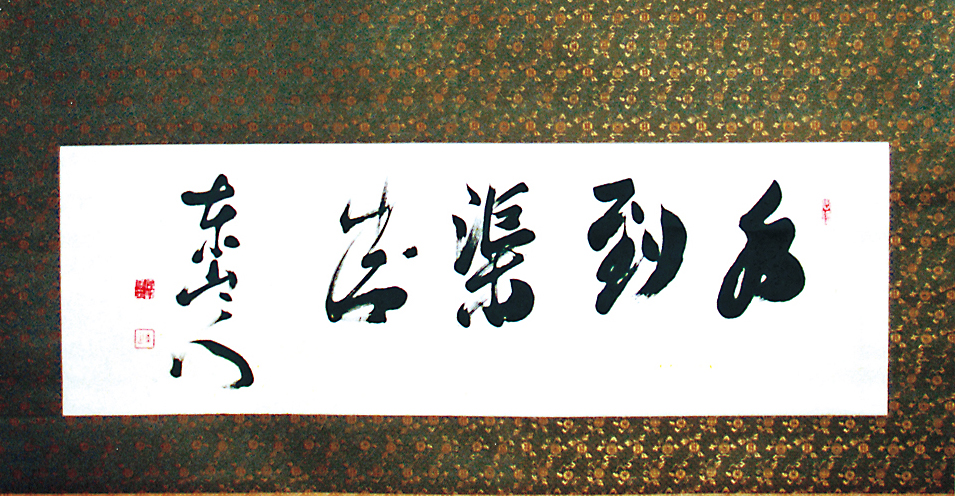Our Roots A history of rising to the challenge vol.9
Yataro's Ideals Live On
We focus on the passing of Mitsubishi founder Yataro Iwasaki and reflect on his remarkable legacy.

*The excepts below are translations of passages from Iwasaki Yataro Monogatari ("The Tale of Yataro Iwasaki") by Seiichi Narita
Yataro spent his last days in great pain before dying of stomach cancer at the age of 50. At the time, Mitsubishi was embroiled in a fierce battle with a rival company and it was at the height of this struggle for supremacy in the shipping industry that Mitsubishi lost its great leader.
Yataro's last moments are described in Iwasaki Yataro Den ("The Story of Yataro Iwasaki"):
At Yataro's bedside were his eldest son, Hisaya, his younger brother, Yanosuke, and other family members, along with executives from Mitsubishi. Yataro's breathing had become irregular. He suddenly opened his eyes and began to speak in a strained voice: "I've only accomplished one or two of the ten things I'd hoped to achieve." His breathing faltered, but he continued on: "Hisaya is to be my direct successor*. Yanosuke, you are to guide Hisaya. Look after him. Take good care of the business and stay true to my vision." Yanosuke replied without hesitation, "Brother, rest assured I will make every effort to honor your wishes so long as I shall live." Yataro nodded and said faintly, "I will say no more. It feels as if my stomach will split open." He grimaced in pain and closed his eyes. Before long, he opened his eyes, slightly lifted his right hand as if to say goodbye and took his last breath.
Yataro's mother, Miwa, left a similar account of Yataro's passing:
Yataro voiced his last wishes to Yanosuke. Hisaya was to be Yataro's direct successor under the guidance of Yanosuke and they were to strictly adhere to Yataro's ideals. His parting words were so dignified; I was deeply moved. Yanosuke replied that he would do everything in his power to honor Yataro's wishes. The two shared a close bond to the very end... (From Bifukuin Fujin Shuki Sanyo ("The Private Papers of Miwa Iwasaki"))
One of the doctors who witnessed Yataro's last moments remarked with admiration: "Yataro displayed great fortitude as he voiced his last wishes; I had never seen someone so calm and self-possessed at the time of his death."
Meiji-era samurai were dedicated to the ideals of honor and service to one's country. Yataro embodied this spirit throughout his life, with his unwavering commitment to contribute to society. This spirit continues to be passed from generation to generation through the Three Corporate Principles as Shoki Hoko or "Corporate Responsibility to Society"
- *As Hisaya was just 19 years old when Yataro's died in 1885, Yanosuke ran Mitsubishi as its 2nd president until Hisaya was ready to take up the post. Hisaya became president at the age of 28 when Yanosuke stepped down in 1893.

A Work of Calligraphy by Yataro
This work of calligraphy by Yataro was inspired by a line from the 12th-century Chinese poet Fan Chengda. The line is often translated as "where water flows, a channel is formed". It suggests that things will naturally fall into place as long as one makes sustained efforts. This is a fitting phrase for Yataro, who achieved great success while never yielding in the face of difficulties.
(Photo courtesy of the Mitsubishi Archives)